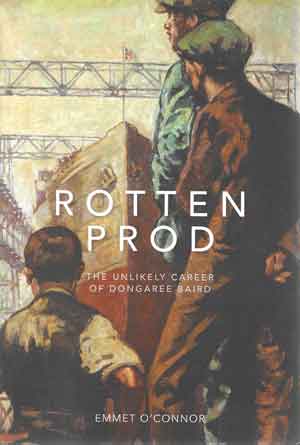ROTTEN PROD: THE UNLIKELY CAREER OF DONGAREE BAIRD
Published in Book Reviews, Book Reviews, Issue 2 (March/April 2023), Reviews, Volume 31EMMET O’CONNOR
UCD Press
€27
ISBN 9781910820858
Reviewed by Niall Meehan
Niall Meehan is the retired head of the Journalism and Media Faculty, Griffith College.
Accounts of the 1912 and 1920 Belfast shipyard expulsions detail tens of thousands of Catholics forcibly driven from their places of employment, followed by being burned out of their homes.
As the author points out and details in this book, Protestants, mainly socialist trade unionists, were expelled too. As O’Connor details in depth, their plight and that of Catholic victims is quite often rationalised into obscurity. So-called ‘rotten Prods’ are, by and large, forgotten Prods.
The emerging Ulster Unionist Party power structure was attuned to twin threats to its counter-revolutionary Partition project: republicanism and socialism. External and internal political and economic pressures undermined a bifurcated working class in the most industrialised part of Ireland, segregated by Protestant privilege and Catholic subordination. Non-sectarian republican pressures were closing in from the rest of Ireland. Non-sectarian socialism, spurred on by the Russian Revolution and post-war working-class upheavals in Britain and the Continent, threatened from within.
O’Connor shows that Unionists were unnerved by socialist trade union leadership during the 1919 engineering strike, which involved ‘up to 40,000 workers directly, 20,000 indirectly and 44 businesses, including the shipyards …’. A ‘Belfast Soviet’ controlled gas, water and electricity supplies. Despite this, the strike leadership ‘was determined to keep the strike parochial and a-political’, which meant dissociating from trade union struggles in both Britain and the rest of Ireland. The RIC commended the General Strike Committee for, as O’Connor observes, ‘eradicating the influence of revolutionary tourists’. The force also ‘inscrib[ed] 300 strikers as special constables’.
The strike was lost, thought Baird, partly through misleadership. The strike’s potential was not lost on unionism. O’Connor outlines how ‘a web of overlapping patriotic workers’ organisations in the UK, in which Unionist leaders had a prominent role’, augmented the Ulster Protestant Association, the British Empire Union and Comrades of the Great War. They incorporated pre-existing Orangeism and prepared a counter-strike.
Whereas in Britain similar formations were fixated on an ‘alien menace’ and created a basis for fascism, in the North they remained rooted in anti-Catholic sectarianism, though other forms of prejudice were deployed as the need arose. The Morning Post, cited by O’Connor, called Dublin-born strike leader Simon Greenspon ‘a Jew of Russian descent’ and one of two ‘Trotskys of Belfast and Glasgow’ (the second ‘Trotsky’, like his actual namesake, was also Jewish). Not to be outdone, the Church of Ireland Gazette remarked that ‘The Russian Jew … along with his Sinn Féin friends has succeeded in dragging the Belfast working man into a terrible mess’.
A politically backward section of the working class was on hand to lap up this propaganda and then to complete a task of anti-Catholic and Protestant purification. There was very little unionist opposition. O’Connor observes that, ‘When the evictions escalated into a pogrom, the civil strife commanded an unusual level of backing from the Unionist middle class’. Whether these events constitute ethnic cleansing is secondary to the fact that targeted assaults on a whole population, and on those perceived as determined opponents of sectarian reaction, were successful. Northern Ireland earned its bloody birth certificate, stamped with sectarian hegemony.
O’Connor’s study of James Baird, a comprehensive recovery of scattered evidence, clearly articulates the political pathway of a little-known hero of the ‘rotten Prod’ cause. Baird was, as O’Connor outlines, a labour organiser in the North and then, after being driven out, in the south-east, where he led the 1923 Waterford farm-labourers’ strike. The Waterford farmers’ leader, former unionist and newly appointed Free State senator Sir John Keane, and Minister for Home Affairs Kevin O’Higgins recognised a formidable opponent. Baird was arrested and went on hunger strike.
A Baird–Keane contrast illustrates something about Ireland in the 1920s. The Free State augmented the five Protestants elected to its 60-member Senate with the appointment of 23 more (and one Jew, a countess). These were of the well-heeled Keane variety, content to promote their class interests under a new dispensation. Baird, who led opposition to the shipyard expulsions, was not the sort of Protestant that Free State authorities wished to cultivate, nor indeed was Greenspon a suitable southern Jew. Non-sectarianism in the South, ‘one of the great achievements of the Republic’, remarks O’Connor accurately, though popular from below was carefully controlled from the top.
O’Connor noted that, ‘as a skilled worker, a Protestant and a socialist politician who would end up embracing republicanism, Baird became emblematic of the peculiarities of Belfast in 1920’. His contemporary obscurity is testament to a Russian spark that caught fire in 1917, when all seemed possible, but which native reaction quenched. Politically progressive forces were driven backwards. Some, like Baird, disappeared, in his case to Australia from 1927 until his death in 1948. Republicans, socialists, women activists—all retreated in both jurisdictions, arguably until the mid- to late 1960s, when a combination of local and international influences again burst open an increasingly brittle shell of conservatism, conformity and repression.
Emmet O’Connor has successfully retrieved a remarkable leader and his times from history’s dustbin. Baird deserves to be remembered; this book should be read.

















